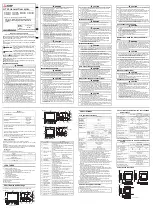
FRANÇAIS
29
14
BO AT INSTALLATIO N
W ARNING :
Only ground the DC system to battery negative (one-point ground). Never
ground the DC system to the boat bonding system or to any metallic part, fixture, or
component on the boat.
NO TE:
An existing common ground wire may connect the negative battery terminals
of two or more on-board batteries. This cable will not interfere with the SunSaver Duo
operation.
Figure 5. Typical boat wiring diagram
Before proceeding :
x
Install the solar module(s) per the manufacturer’s instructions.
x
Batteries should be installed per the U.S Coast Guard regulations for
pleasureboats. The batteries must be secured to prevent movement and the
battery terminals covered to prevent arcing. A battery box to contain any
spilled battery acid is strongly recommended.
x
The SunSaver Duo should be mounted per the instructions in section
2.3
M ounting
.
Step 1: Battery # 1 (“house” battery bank)
Wire the negative terminal of the “house” battery to the negative
Battery 1
terminal on the SunSaver Duo with black wire as shown in figure 5. Wire the
“house” battery positive power cable as shown in figure 5. Wire a DC-rated in-line
fuse holder in the cable. The length of cable between the Battery (+) post and in-
line fuse holder should be no longer than 12” ( 305 mm ). Use wire with red
Figure 5. Schéma de câblage de bateau typique
Avant de poursuivre :
• Installer le(s) module(s) solaire(s) conformément aux instructions du
fabricant.
• Les batteries doivent être installées conformément à la
réglementation américaine en vigueur de la garde côtière (U.S. Coast
Guard regulations) concernant les bateaux de plaisance. Attacher les
batteries de manière à empêcher tout déplacement et couvrir leurs
bornes pour empêcher la formation d’arcs électriques. Il est fortement
conseillé de prévoir une caisse de batterie pour contenir tous les
débordements d’acide.
• Poser le SunSaver Duo conformément aux instructions de la
section Pose.
Étape 1: Batterie 1 (groupe de batteries « habitation »)
Raccorder la borne négative de la batterie « habitation » à la borne
Batterie 1 négative du SunSaver Duo au moyen d’un fil noir comme
indiqué sur la Figure 5. Poser le câble d’alimentation positif de la
batterie « habitation » comme représenté sur la Figure 5. Poser un
porte-fusible pour courant continu en série sur le câble. La longueur
de câble entre la borne (+) de la batterie et le porte-fusible en série
ne doit pas dépasser (305 mm) (12 pouces). Utiliser du fil à gaine
rouge de calibre correct pour le courant de charge (voir la dernière
page).
Ne pas encore placer de fusible dans le porte-fusible.
Étape 2: Batterie 2 (batterie « habitation »)
Raccorder la borne négative de la batterie « habitation » à la borne
Batterie 1 négative du SunSaver Duo au moyen d’un fil noir comme
indiqué sur la Figure 5. Poser le câble d’alimentation positif de la
batterie « habitation » comme représenté sur la Figure 5. Poser un
Summary of Contents for SUNSAVER DUO
Page 19: ......
Page 51: ...DEUTSCH 51...
















































